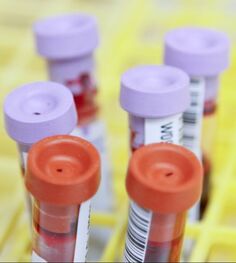Laurie Anne Walden, DVM Photo by Daniel Sone, National Cancer Institute. Photo by Daniel Sone, National Cancer Institute. Laboratory testing of blood, urine, and stool samples is routinely done for animals. Abnormalities often show up on lab tests before an animal has obvious symptoms. Even healthy pets need to be tested regularly for parasites. Well-animal tests can detect problems early and help veterinarians track changes over time. These are some of the reasons your veterinarian might recommend lab tests for your pet:
Complete Blood Count A complete blood count measures the number, size, and shape of each type of cell in the blood.
Blood Chemistry Panel Blood chemistry tests measure substances in the blood that indicate changes in organ function or other biological processes. Blood chemistry analysis is run as a panel of many individual tests. A chemistry panel doesn’t always give a diagnosis for a sick animal, but the results can help the veterinarian narrow down the list of possibilities. Veterinary laboratories offer many chemistry panels for different species and diagnostic needs. A small panel that’s sufficient for a young animal before routine surgery might not be appropriate for an ill animal or an older pet. These are a few of the tests commonly included in chemistry panels:
Urinalysis Analysis of the urine includes specific gravity (a measure of urine concentration), pH, chemistry results like glucose and protein levels, and microscopic evaluation for cells, crystals, and bacteria. Urinalysis can reveal urinary tract infection, support a diagnosis of diabetes, and help evaluate the function of the kidneys and other organs. A complete laboratory analysis—especially for a senior pet—should include urinalysis. Parasite Tests Parasites are very common in pet animals (unless they have received regular parasite prevention as recommended by a veterinarian). Many of the parasites that pets carry are contagious to people. At least once a year, pets should have a stool test for intestinal parasites like hookworms and roundworms. Dogs should also have a yearly blood test for heartworm disease. Public domain image source: National Cancer Institute, Daniel Sone (photographer) Comments are closed.
|
AuthorLaurie Anne Walden, DVM Categories
All
Archives
June 2024
The contents of this blog are for information only and should not substitute for advice from a veterinarian who has examined the animal. All blog content is copyrighted by Mallard Creek Animal Hospital and may not be copied, reproduced, transmitted, or distributed without permission.
|
- Home
- About
- Our Services
- Our Team
-
Client Education Center
- AKC: Spaying and Neutering your Puppy
- Animal Poison Control
- ASPCA Poisonous Plants
- AVMA: Spaying and Neutering your pet
- Biting Puppies
- Boarding Your Dog
- Caring for the Senior Cat
- Cats and Claws
- FDA warning - Bone treats
- Force Free Alliance of Charlotte Trainers
- Getting your Cat to the Vet - AAFP
- Holiday Hazards
- How To Feed Cats for Good Health
- How to Get the Most Out of your Annual Exam
- Indoor Cat Initiative - OSU
- Introducing Your Dog to Your Baby
- Moving Your Cat to a New Home
- Muzzle Training
- Osteoarthritis Checklist for Cats
- What To Do When You Find a Stray
- Our Online Store
- Dr. Walden's Blog
- Client Center
- Contact
- Cat Enrichment Month 2024
|
Office Hours
Monday through Friday 7:30 am to 6:00 pm
|
Mallard Creek Animal Hospital
2110 Ben Craig Dr. Suite 100
|
Site powered by Weebly. Managed by IDEXX Laboratories

 RSS Feed
RSS Feed